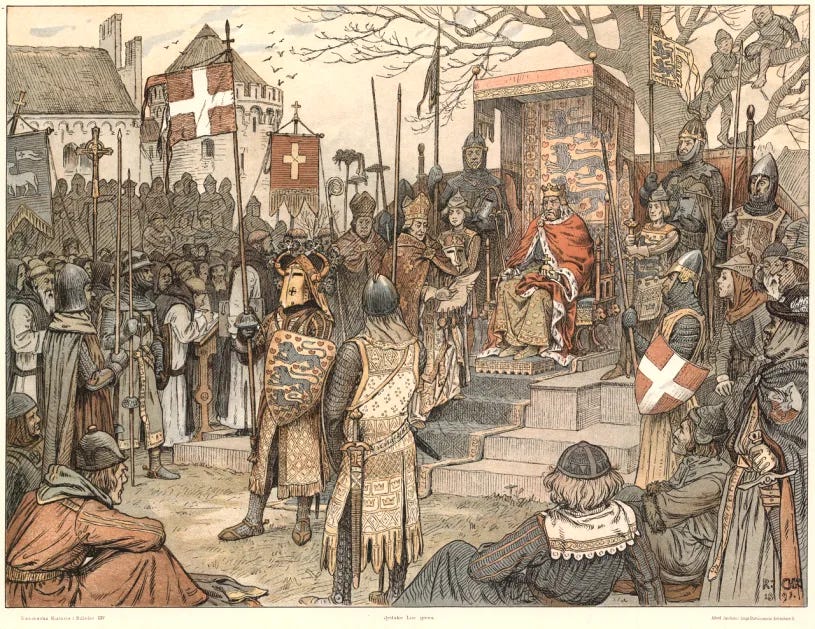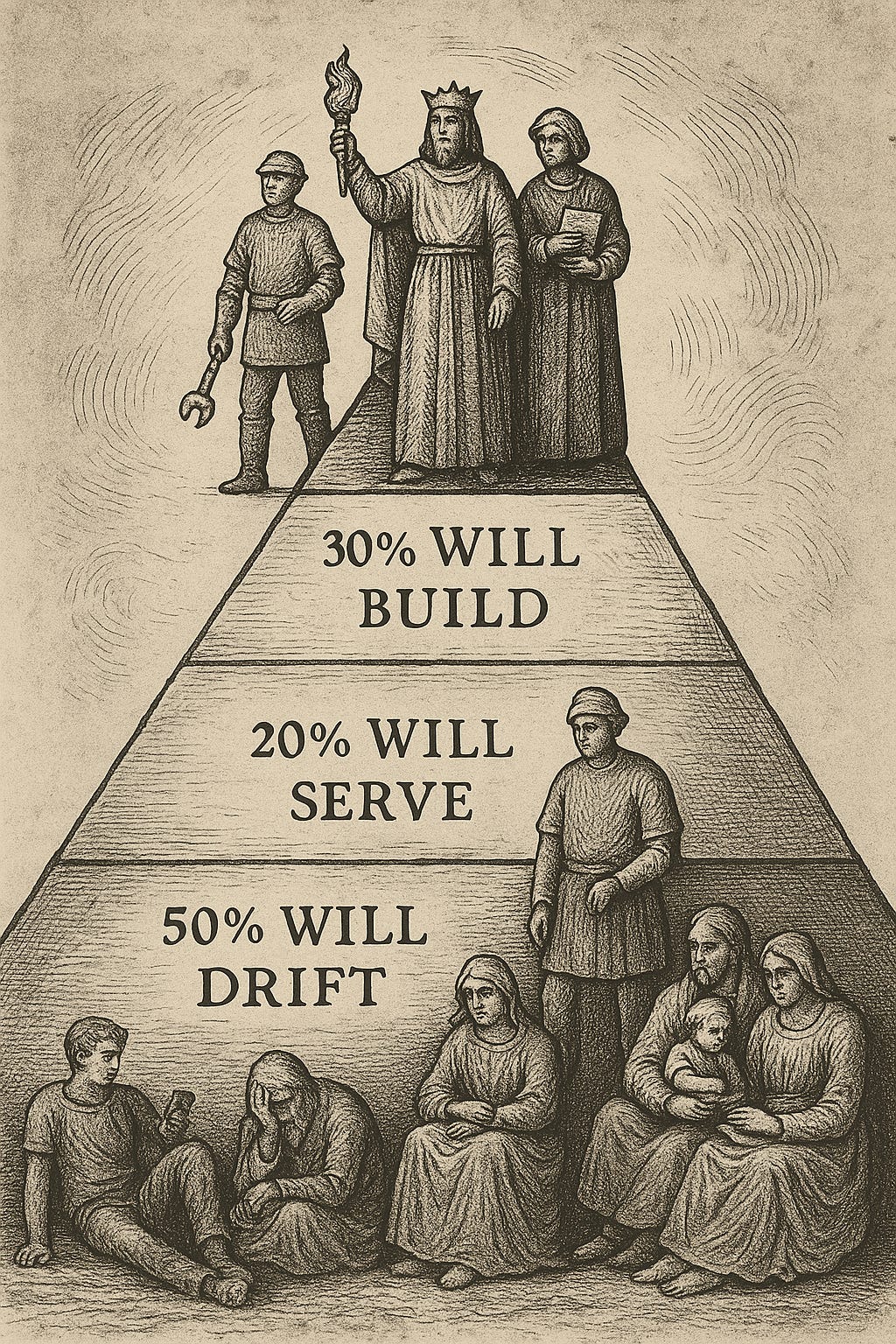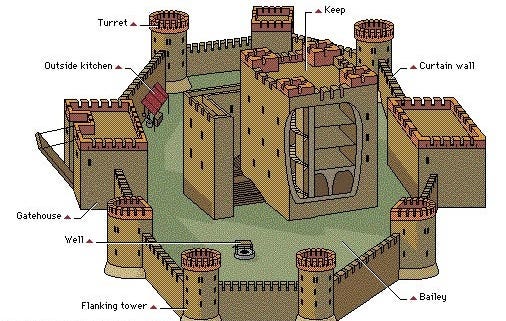The Return of the Lords
How AI is restoring Feudalism (and How to become Sovereign as a Builder)
Your kids may grow up in a world that doesn’t need them. Not judged by character or effort, but by their capacity to consume, comply, or entertain.
As a father of two, that idea hit me even harder after I heard it from Geoffrey Hinton - the so-called “Godfather of AI”, Nobel prize winner. As many others, he said that in 10-20 years, AI may render most human jobs obsolete. So we and our children might be replaced, purposeless, and addicted to dopamine loops.
That fear sent me spiraling back to something I was obsessed with in my teenager times: the neo-Luddite movement. Throughout history, when transformative technology emerged, some people tried to destroy it. The most extreme even resorted to violence (bombings, assassinations) believing that technology itself was the enemy enslaving humanity.
Their methods were abhorrent, but their core question still burns like a 5G antenna tower:
What happens to society when technology evolves faster than our purpose?
You won’t like my hypothesis: I believe a new Feudal Age is emerging.
Welcome to Digital Neo-Feudalism
This isn’t a sci-fi dystopia where killer robots chase us through neon-lit alleys. It’s something subtler. More familiar.
Imagine the Middle Ages:
Lords owned the land, the weapons, the power.
Serfs gave up autonomy and hoped not to starve.
Vassals served with skill, in exchange for protection or pay.
Now fast forward to 2025:
The new Lords are those who wield AI at scale: big tech, investors, sovereign technologists like Musk, Huang or Altman. They control the digital land, the algorithms, the compute.
The Serfs are already here, at least in Europe: many addicted to dopamine, spiritually disengaged, unemployed waiting for Universal Basic Income, or hiding in videogames while life slips by. And this is where the new Lords step in. As their systems render traditional jobs obsolete, the burden of societal stability falls to the very entities causing the disruption.
And the Vassals: the current working class. All white and blue collars: middle managers, lawyers, doctors, consultants, coders. We’ll have work… for a while.
Intelligence, once the great equalizer, is now abundant and cheap. You can summon Ivy-League-level reasoning in seconds. The result? A crisis of differentiation.
Our schools still train students for jobs that no longer exist. Grads face the abyss: AI-enhanced seniors are 10x faster, and companies would rather hire one augmented expert than five interns. The education system must evolve, or risk becoming a conveyor belt to irrelevance.
An AI-augmented PM now answers to three layers of dashboards and two automated prompts before their manager, who will be soon delegating 90% of tasks to agents. A designer ships brand kits generated by AI moodboards overnight. A solo founder raises $200k to run a company with no staff, just an LLM pipeline and Figma agents.
AI is not killing jobs. It kills job safety .
Feudalism as Code: a New World Order
Consider this:
As of June 2025, Microsoft's market cap surpasses $3.5 trillion: similar than the GDP of the UK or India.
Apple hovers close behind, richer than France.
Google and Amazon each dwarf the economies of Spain, South Korea, and Saudi Arabia.
Together, the top five tech companies (Apple, Microsoft, Google, Amazon, Meta) command 4x more value than the entire African continent’s GDP.
These aren't companies anymore. They're neo-feudal powers: projecting to become banks, governing communities, policing AI, and even replacing state welfare.
In fact, Big Tech giants and mega-corporations could take on the role of de facto states, funding the masses with UBI. It’s not charity; it’s the cost of maintaining a quiescent populace and ensuring their platforms have consumers.
And so, a new feudalism emerges: where loyalty is pledged not to kings or flags, but to platforms.
In essence, this is what digital feudalism looks like:
Vertical dependence
Algorithmic loyalty, and
Reward by proximity to the node of capital and compute.
Call it a proximitycracy: a world where power concentrates not through merit, but through closeness to infrastructure: the compute clusters, the social algorithms, the VC-backed ecosystems. The closer you are to these nodes, the more leverage you have. The further away, the more disposable or irrelevant you become.
This isn't just affecting users or small builders. It’s reshaping the middle class of tech: the PMs, Designers, Engineers, and even startup founders.
Ask yourself: You use GPT and Replit or Cursor to ship faster. That’s great. But the very system that boosts your speed also erodes your uniqueness. You're not becoming irreplaceable; you're just speeding up your obsolescence.
You’re not building a moat.
You’re building a bridge… for someone else to cross over you.
This isn’t paranoia. It’s structural.
And the new Lords don’t need to be evil. The system runs itself; on incentives, not intentions.
My Hypothesis: The 50/30/20 Future
Is this inevitable? Maybe not. Black swan events (breakthrough regulations, unexpected alliances, cultural shifts) might still reshape the terrain. But the current trajectory is clear: a return to hierarchy and irrelevance, not through land, but through compute and capital.
Here's how I see the next 20 years unfolding, based on patterns I observe in Europe where many people already prioritize stability over risk:
About 50% will drift into passive lives: sustained by UBI, numbed by TikTok and porn. This isn't necessarily dystopian: some will find deep meaning in community service, spiritual practice, and family life. But many will simply consume and decay, choosing the safety of dependence over the uncertainty of building.
Around 30% will build: founders, artists, creators. Using AI like fire: to forge, cook, or burn. Entrepreneurship won't be a “natural” choice anymore; it will be a mix of purpose and survival.
The remaining 20% will serve: niche experts, tradespeople, AI-augmented craftspeople. Some of them will work for the Builders, Big Tech or the Public Administration. Others will be self-employed craftsmen: the plumber with AR glasses and scheduling bots who out-earns the MBA who used to make strategy decks.
While white-collar work is eaten by language models, blue-collar is being reborn as human-in-the-loop systems
The percentages are my hypothesis, not prophecy. But the pattern feels inevitable:
Those who drift become peasants, dependent on systems they don't control.
Those who serve become high-income vassals; some proud craftsmen, others trapped in legacy organizations.
Many of those who dare to build become lords, forging new services, ecosystems and tools.
Sure, AI might steal our job in many subtle ways. But look on the bright side: we’ll finally have time to finish that YouTube playlist called ‘How to Find My Purpose’. This isn’t apocalypse.
The Path to Sovereignty
So how do we prepare ourselves to thrive with meaning? And what do we teach our children to prepare them for the next 10 or 20 years?
Not just creativity or coding.
Not just critical thinking or compassion.
We learn and teach them entrepreneurship and spiritual resilience as a path to sovereignty. Not hustle. Not greed. But maybe a new belief system:
I take ownership.
I serve my community.
I build something real.
I live from my soul’s purpose.
Because if AI eats all the jobs, the only work left will be:
Solving real problems,
Building tribes,
Offering beauty, healing, meaning,
And creating what’s worth keeping.
In short:
Kingdom-Building.
What's a kingdom here?
Your kingdom is your stack of autonomy: identity, intellectual property, audience, assets, rituals, and tribe.
It's the system you design to generate value, meaning, and sovereignty; whether you're an artist, healer, hacker, or builder, and stay “off-grid” digitally speaking.
This isn't about becoming the next tech billionaire. Kingdoms don't have to be empires. They can be micro-realms: one-woman consultancies, the genius watchmaker from his home workshop, homeschooling collectives, purpose-driven startups, or cult indie games.
The point is: you own it. You shape its values. And AI becomes your sword, not your leash.
Yes, some kingdom-builders may become new feudal lords. That's not a bug: it's a feature. The goal isn't to prevent hierarchy but to ensure you're not trapped at the bottom of someone else's.
Adapt, or Be Ruled
We can’t stop this reformation. No emperor ever halted a printing press. But we can choose our posture. Like the stoics, we can:
Embrace what we control,
Prepare our children not for comfort, but for sovereignty,
And build our citadels with dignity.
Yes, Geoffrey Hinton is brilliant, and his warnings matter. As citizens, we must keep pressing policymakers to regulate in the right direction. But the context matters even more: the worldview of experts like Hinton is shaped by proximity: to machines, to fear, to reductionist thinking that sees spirit as software.
As Seneca wrote:
"We suffer more in imagination than in reality."
So be cautious with prophets of doom. Don’t let dystopias paralyze you. Just adapt quickly by taking massive action.
Ready to Build Your Kingdom?
I don’t want my children raised by mega-orgs, algorithms and market trends. I want them raised by independent builders. So I decided to build.
In upcoming essays, I’ll dive into the practical mechanics of kingdom-building: how to identify and create systems that generate both meaning and autonomy. We'll explore:
The Kingdom Builder's Playbook: Mapping 'value nodes' – skills and assets most resistant to automation, from artisanal crafts to deep human connection.
The Evolving PM Role: Identifying our quo vadis and unique position in the new world order.
Algorithmic Loyalty: Understanding how AI influences our choices and building systems aligned with our values.
Digital Sanctuaries: Creating spaces and rituals of offline connection and creative expression to ground you.
Join me, and refuse to sleepwalk into this future.
We still have time.








For a Stoic you seem to have an incredibly narrow definition of purpose, the ways in which man can find purpose and an even more narrow understanding of history.
Humanity spent more than 98% of its entire existence without modern economics, capitalism, defined jobs or money and we did just fine.
There are absolutely zero indications that pre historic civilisations had lower life satisfaction than modern civilisationa, quite the opposite in fact.
Prehistoric works of art from Caves in France, South Africa to Chile as well as massive earthenwork projects uncovered in Turkey, the Amazon and Russia, all indicate that massive cities already existed, where great labour forces were assembled. All within societies that actively applied administration to avoid the need for money, the acquisition of excessive wealth or power by individuals.
People led very good lives in great numbers without the modern ratrace or the belief in its necessity for progress introduced by Rousseau and his contemporaries to defend European ideas against criticism from natives and their appeal to reason during the enlightenment.
You like Geoffrey Hinton are just a doomer giving in to negativity bias and employing confirmation bias to exacerbate your disproportionate fear.
There is an equal and opposite possibility for a future that is better and far more purpose filled than anything we have today.
Most people do not enjoy their jobs, they are in effect economic slaves to their need to provide for themselves and their offspring.
Ai and Robotics can provide a future in which human labour no longer is the limiting factor in production, nor will it therefore allow to be used as a means of control anymore. We can make a future where we are all truly free, rather than slaves to promises dressed up as 'Rights' to which most of us, in practice, have no real access.